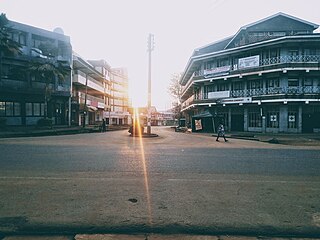Notes
- ↑ Wang, Audrey (14 January 2011). "Plant factories: the future of farming?". Taiwan Today.
- ↑ "Japan reconstituting plant factory concept". Fresh Plaza. 4 June 2010. Archived from the original on July 16, 2012.
A plant factory is a closed growing system which enables a plantsman to achieve constant production of vegetables all year around. The facility utilizes artificial control of light, temperature, moisture, and carbon dioxide concentrations. [1] [2]
The following outline is provided as an overview of and topical guide to agriculture:

Intensive agriculture, also known as intensive farming, conventional, or industrial agriculture, is a type of agriculture, both of crop plants and of animals, with higher levels of input and output per unit of agricultural land area. It is characterized by a low fallow ratio, higher use of inputs such as capital, labour, agrochemicals and water, and higher crop yields per unit land area.

Agronomy is the science and technology of producing and using plants by agriculture for food, fuel, fiber, chemicals, recreation, or land conservation. Agronomy has come to include research of plant genetics, plant physiology, meteorology, and soil science. It is the application of a combination of sciences such as biology, chemistry, economics, ecology, earth science, and genetics. Professionals of agronomy are termed agronomists.

Pasture is land used for grazing.

AGCO Corporation is an American agricultural machinery manufacturer headquartered in Duluth, Georgia, United States. It was founded in 1990. AGCO designs, produces and sells tractors, combines, foragers, hay tools, self-propelled sprayers, smart farming technologies, seeding equipment, and tillage equipment.

Western Province was one of Kenya's seven administrative provinces outside Nairobi. It is inhabited mainly by the Luhya people. Quakerism is widely practised here. Kenya's second highest mountain, Mount Elgon is located in Bungoma District. The Kakamega Forest rainforest is part of the area. The province capital was Kakamega. After the 2013 general election, and the coming into effect of the new constitution, provinces became defunct and the country was now divided into 47 counties. Each county has its own government and therefore there is no central regional capital. Western Province became the Western region, comprising four counties: Kakamega, Bungoma, Vihiga, and Busia.

Bungoma is the headquarters of Bungoma County in Kenya. It was established as a trading centre in the early 20th century. It is located in Kenya's fertile Western region and at the foot of Mount Elgon, Kenya's second tallest mountain. The town and the surrounding areas boast of one of Kenya's highest average rainfall, making it one of the nation's most important food baskets.

Samuel Oldknow (1756–1828) was an English cotton manufacturer.

The Minsk Governorate or Government of Minsk was a governorate of the Russian Empire. The seat was in Minsk. It was created in 1793 from the land acquired in the partitions of Poland and lasted until 1921. Its territory covered majority of modern Belarus.
Controlled-environment agriculture (CEA) -- which includes indoor agriculture (IA) and vertical farming—is a technology-based approach toward food production. The aim of CEA is to provide protection from the outdoor elements and maintain optimal growing conditions throughout the development of the crop. Production takes place within an enclosed growing structure such as a greenhouse or plant factory.

Gene Baur, formerly known as Gene Bauston, is an author and activist in the animal rights and food movement. He’s been called the "conscience of the food movement" by Time magazine, and opposes factory farming and advocates for what he believes would be a more just and respectful food system. Baur is president and co-founder of Farm Sanctuary, a farm animal protection organization. He is vegan and has been involved with animal rights since he co-founded Farm Sanctuary in 1986. Baur has authored two books and various articles.
Wild farming is a growing alternative to "factory farming" that consists of planting crops that are highly associated and supportive to the natural ecosystem. This includes intercropping with native plants, following the contours and geography of the land, and supporting local food chains. The goal is to produce large crop yields, while still promoting a healthy environment. Wild farming is a backlash against the dominance of factory farming which is a dominant factor in the food industry and has a 'myth' that industrial agriculture is more efficient. Up until the mid 20th century, agricultural crop yields relied on natural inputs such as rainfall patterns, natural soil resources, recycling of organic matter, and built-in biological control mechanisms. Currently, agricultural practices have been conventionalized to include large monocropped fields and the use of synthetic pesticides and fertilizers. Avoiding the conventional farming practices, wild farming adopts many practices from sustainable agricultural systems such as agroecology, permaculture, forest farming, and greywater systems.

Intensive animal farming, industrial livestock production, and macro-farms, also known as factory farming, is a type of intensive agriculture, specifically an approach to animal husbandry designed to maximize production while minimizing costs. To achieve this, agribusinesses keep livestock such as cattle, poultry, and fish at high stocking densities, at large scale, and using modern machinery, biotechnology, and global trade. The main products of this industry are meat, milk and eggs for human consumption. There are issues regarding whether intensive animal farming is sustainable in the social long-run given its costs in resources. Analysts also raise issues about its ethics.
Animal-free agriculture, also known as veganic agriculture, stockfree farming or veganic farming, consists of farming methods that do not use animals or animal products.
Sentience Politics is a Swiss anti-speciesist political organization with the goal of reducing the suffering of non-human animals. Founded in 2013, their activities include political campaigns, such as ballot initiatives for sustainable food, fundamental rights for primates or a ban on factory farming.

Jacy Reese Anthis is an American social scientist, writer and co-founder of the Sentience Institute with Kelly Witwicki. He previously worked as a Senior Fellow at Sentience Politics, and before that at Animal Charity Evaluators as chair of the board of directors, then as a full-time researcher.

The End of Animal Farming: How Scientists, Entrepreneurs, and Activists Are Building an Animal-Free Food System is a 2018 book by Jacy Reese that argues animal farming will end by the year 2100 based on effective altruism reasoning and social movement strategy.

The Sentience Institute (SI) is an American interdisciplinary think tank that specializes in effective altruism and social movement research. It was founded by Jacy Reese Anthis and Kelly Anthis in June 2017 and has published research reports on various social movements and new technologies.
Jim Mason is an American lawyer, journalist and animal rights activist.

CoVLP was a COVID-19 vaccine developed by Medicago in Canada and GlaxoSmithKline (GSK). The product and Medicago, Inc. were owned by Mitsubishi who terminated the company and program in February 2023 due to high international market competition for COVID-19 vaccines.